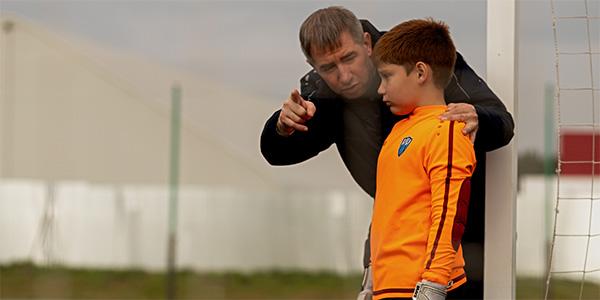
Kids Who Take on A Positive Attitude
Summary: Many young athletes struggle to reach their full potential in sports due to performance anxiety and fear of disappointing their coaches. This article highlights how sports parents can support their children in building confidence and shifting from a fear-based to a positive mindset.
A number of factors can influence whether a young athlete lives up to his or her potential in sports. As a sports parent, Brad Tebbutt of Portland, Ore. faces a classic challenge: His 12-year-old son, Jordan, doesn’t play basketball to the best of his abilities.
A number of factors can influence whether a young athlete lives up to his or her potential in sports. In this case, Jordan’s issue is a common one: He worries too much about whether his coach approves of his performance.
“He has really struggled to play up to his potential,” says Tebbutt. “He is obsessed with, ‘Am I doing the right things? Will I get approval from the coach? Will he like what I do? Will he bench me?'” Because Jordan is very driven, he assumes his coaches expect a lot from him, Tebbutt adds.
When young athletes like Jordan worry so much about “doing the right thing,” they’re wrapped up in a failure-oriented approach to sports. They concentrate too much on avoiding mistakes. Rather than focusing so much on what they did or could do wrong, young athletes need to aim for success. Sports parents can help kids do this.
Parents should begin by talking to the child about what he or she worries about. Help the child pinpoint his or her fears. Does the child worry about being teased, benched or criticized? Point out that this is a failure-oriented approach to sports, and suggest that the athlete focus more on success.
It’s also helpful if parents give their kids permission to make mistakes. Tell them it’s okay to drop the ball or air a free-throw shot from time to time. Remind them that everyone commits these blunders. But athletes who recover quickly, shake off the mistake and move on are most likely to build confidence and succeed.
Parents should also help their child identify small goals that will help them aim for success. In basketball, those goals might include improving his or her free-throw percentage or grabbing more rebounds.
When the child or teen is on the court, he or she should concentrate on reaching for these targets. When a young athlete is focused on tasks like snatching rebounds or stealing the ball, he’ll likely enjoy the game more. He’ll find that he’s more focused on the here-and-now, as opposed to worrying about the future–what Coach will think of me after I make this shot.
When a child or teen athlete focuses on such small goals and gets into the “Zen” of sports, he’s changing how he thinks while he plays. His mind is full of positive goals, rather than negative worries. Taking on small goals is a critical step toward becoming a success-oriented player.
Dony Wilcher, Jordan’s basketball coach and program director for Showtime Athletics, Portland, Ore., says he’s asked Jordan to try out this strategy. And it has paid off.
“We’ve been giving Jordan small goals,” says Wilcher. “We tell him to focus on keeping his opponent from getting the ball, for example. This frees him from worrying so much. This gets rid of the ‘Over the shoulder syndrome,’ looking over your shoulder to see what Coach thinks. Instead, at the end of the game, he thinks about, ‘Did I complete those small tasks?'”
As Jordan continues with this approach, he’ll likely build even more confidence. He’ll worry less about the coach’s opinion. He’ll tell himself, “It’s okay to make mistakes.” He’ll embrace success, rather than avoiding failure.
Dr. Patrick Cohn and Lisa Cohn are founders of The Ultimate Sports Parent. Listen to their radio show and download their free e-book, “Ten Tips to Improve Confidence and Success in Young Athletes,” by visiting www.youthsportspsychology.com.
Tips for Having a Positive Attitude
1. Help Kids Shift from Fear of Failure to a Positive Attitude
If your child is overly focused on not making mistakes, help them change their mindset to one that focuses on succeeding instead of avoiding failure. Talk to them about what they can do, not what they should avoid.
2. Give Them Permission to Make Mistakes
Let your young athlete know it’s okay to mess up sometimes. Everyone makes mistakes in sports. What matters is how quickly they bounce back and keep going.
3. Set Small, Achievable Goals
Instead of focusing on impressing the coach or winning the game, encourage your child to set small, specific goals—like improving a skill or completing a task during the game (e.g., grabbing 3 rebounds or staying with their opponent).
4. Keep the Focus on the Present Moment
Help your child stay grounded during games by encouraging them to concentrate on what they’re doing right now—not worrying about what the coach might say later. This promotes confidence and better performance.
5. Reinforce Effort, Not Just Outcome
Praise your child for their effort, focus, and progress toward their small goals, rather than just whether they scored or won. This builds a positive attitude over time.
Related Sports Psychology Articles
- Mental Training for Young Athletes
- How Emotions Affect Sports Kids
- Teach Sports Kids To Focus on What They Can Control
*Subscribe to The Ultimate Sports Parent Podcast
*Subscribe to Peak Performance Sports on Youtube
Download a free sports psychology report to improve your mental game!
The Confident Sports Kid

When kids lack confidence, they doubt themselves, stop taking risks, play tentatively, and are hard on themselves. As a result, kids often lose their motivation to improve. Ultimately, these barriers keep them from enjoying sports and making the most of their physical talent.
“The Confident Sports Kid” program is actually two programs: one that teaches sports parents how to boost their kids’ confidence, and another that teaches young athletes age 8 to 18 how to improve their self talk, avoid negative thinking, overcome expectations that limit confidence, and much more. The program will help kids boost their confidence in sports and life…and enjoy sports more.
FAQ: Help Athletes Reach Their Potential and Embrace a Positive Attitude
Q: Why isn’t my child playing up to their full potential in sports?
A: Many young athletes underperform because they worry too much about pleasing their coach or avoiding mistakes. This fear-oriented mindset causes them to focus on what could go wrong, rather than embracing the game and playing freely.
Q: How can I help my child stop worrying about what the coach thinks?
A: Start by having a conversation with your child about their fears. Help them recognize that focusing too much on the coach’s opinion or avoiding mistakes creates unnecessary pressure. Reassure them that it’s okay to make mistakes and that learning from those mistakes is part of growth.
Q: What does it mean to have a positive attitude?
A: A success-oriented mindset shifts the focus from avoiding failure to aiming for achievable goals. Instead of worrying about not making a mistake, young athletes should focus on specific tasks—like grabbing rebounds or improving free-throw percentages—that help them feel accomplished and stay present in the game.
Q: How do small goals help build confidence in young athletes?
A: Small, measurable goals keep athletes focused on what they can control. This reduces anxiety and improves performance by helping them concentrate on the task at hand, rather than external pressures. Over time, accomplishing these goals builds confidence and enjoyment.
Q: What should I say when my child makes a mistake in a game?
A: Reinforce that mistakes are normal and part of learning. Encourage your child to move on quickly and focus on their next play. Saying things like, “It’s okay, just keep going,” helps them stay positive and resilient.
Kids Who Take on A Positive Attitude
Kids Sports Psychology expert Patrick Cohn, Ph.D. has helped athletes for over 35 years to enhance their performance. Dr. Cohn earned a master’s degree in sports psychology from CSUF and a Ph.D. from the University of Virginia, specializing in Applied Sports Psychology. Today, he is the president and founder of Peak Performance Sports, LLC in Orlando, Florida.
